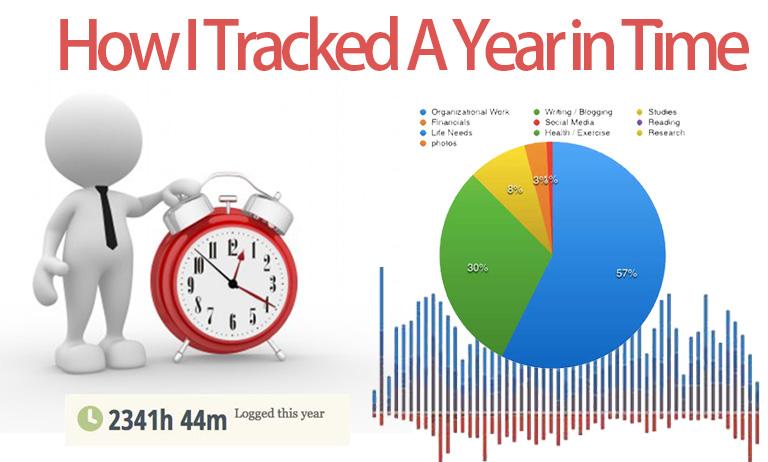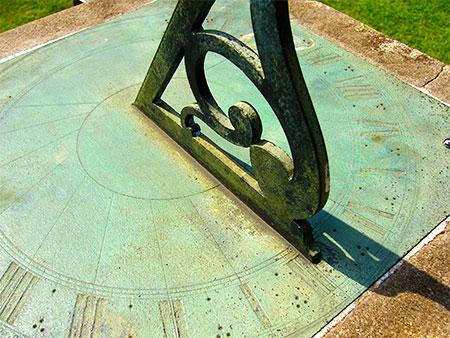
I tracked 27% of my time last year. For over 50% of that, I recorded the actual task or project I was working on during that time. Overall, I have 2341 hours and 44 minutes of total time logs and 1305 hours and 1 minute of task-tracked time logs.
So, from this tracked time, what have I learned?
On a high level, I learned that it’s important to be aware of what you are doing in the moment. For me, to track my time is to be conscious of that time usage. Verbalizing the activity you are working is a powerful way to stay mentally on-task.
Time cannot be “saved” and reused later. Time does not wait. It unwinds. At the end of a year, we have all accumulated 8760 more hours in a life. Much it is passes without engagement or becoming present-in-the-moment.
In my case, after a year of time tracking, I became much more engaged in my time. I am task focused now; my time tracking requires it.
In the end, I can also go beyond this general statistic on a year of time. So, where did my time go in 2015?
Macro-Level: My Total (Tracked) Time
I have been tracking my time in different ways since 2013. Using tools like RescueTime and Toggl, I track my time regularly. After a day, a week, a quarter or, in this case, a year, I’m left with a record of my time, a testament to where my time went.
![]()
According to my RescueTime logs, I spent 2341h 44m on my computer. 6 hours and 24 minutes per day. Divided by our 8760 hours in a year, that means 26.7% of my total time from last year was on my computer.
Takeaway: This past year I spent a lot of time on my computer.
(NOTE: Sadly iPhone does not allow this same level of passive time tracking. I don’t have my mobile time usage.)
According to my Toggle time tracking, I put 1111h 53m into work time and 193h 08m into personal and general organizational time. I ended up actively tracking 1305 hours and 1 minute this past year.
That means 14.8% of total time was actively tracked in some kind of project or task. Or about 3 and half hours per day were on task.
Takeaway: This 3 hours and 34 minutes per day is the critical period I have to get important things done. For my personal achievements and professional progress, this on-task time made it all happen.
This conscious, focused time is how we get things done. We write a novel, plan out our next business, design a building or whatever great thing during one’s focused, activity period.
Obviously you can spend this time in different ways. We have 24 hours in a day but we change the world in this particular slice of focused time. For me, I’m prioritizing my high priority projects in 2016. It’s time to move those boulders!
How Productive Was I?
A lot of thought and writing goes into being productive.
Considering all the achievements I made this last year, I can say this last year was wildly productive for me. Looking at my computer and other tracked time, I’m happy to say my productivity scores match this. My computer time was spent productively.
![]()
To put a number on it, 58% of my time was spent “productivity” or “very productivity” and 24% of my time was “neutral” or neither distracted or productive.
19% of my time was “distracted.” It was spent on entertainment, social media, watching movies and videos, browsing mindlessly, etc.
I also use my computer for entertainment and relaxing. It’s not surprising that roughly 10% of my time went to entertainment.
I contemplated removing certain programs from tracking since it slants my productivity scores. The reality is that I like the idea of tracking as much of my time as possible. Even if some of it goes towards entertainment, it’s an accurate record.
For me, productivity is not simply about spending time on certain websites or marking certain programs as “productive.” It goes farther than that. It’s important that one works on high value projects and tasks. **Being productive about the wrong things really isn’t being productive at all. **
For me this ratio of on-task time to passive tracked time is one of my most data points on personal productivity. The closer my task time tracking time is to my passively tracked time, the more productive I have been.
So, where did my time go on my computer?
According to my records, my most common time usage ranks like this:
- Email and communication
- Design and Composition
- Business
- Entertainment
- Software Development
This breaks down like this:
![]()
In today’s email and instant communications world, it’s no surprise all this email time. Compared to 2014, I had more emails calling my attention. (Note: I should start tracking this). I felt like I deal with email better now.
The amount of time I spent on email (and this is excluding mobile) is jaw-dropping: 404 hours and 54 minutes. That’s over ten full, 40-hour work weeks on email alone in one year.
In 2014, I made a personal commitment to write shorter email and to put my digests into shareable blog posts. This was quite successful, yet I still end up with a lot of time on email. And only hit my email time goal 121 out of 365 days last year:
![]()
Happily 2015 was a year where I did spend more and more time writing, rather than merely writing emails.
A few other interesting breakout facts:
- 98 hours and 40 minutes on Keynote: Last year I spent a lot of time running events and giving presentations. Unfortunately this doesn’t break down presenting time vs preparation time.
- 82h 32m on netflix.com: That’s a lot of TV series but merely 13 minutes per day.
- 32h 24m on VLC Media Player and 27h Quicktime Player
- 66h 47m on 1keyboard: This is a small application that lets you type via your computer to your phone. My initial usage was for typing on WeChat. So combined with 49h 24m I spent on the Mac WeChat app, I spent at least 116 hours on WeChat in 2015.
- 67h 20m on Facebook: I don’t use Facebook on mobile, so this adds up to 11 minutes per day in 2015.
(Work Time) So, which projects and tasks did I spend the most time on?
Beyond the general usage numbers, it’s important to think about project time. This is the time I track on a particular activity, rather than what is passively tracked on my computer.
In 2015, I became a full-time employee at Techstars. This resulted in 811 hours on my computer. Outside of this computer time, I spent the vast majority of my time with meetings, calls, events and other in-person engagements.
In 2015, I shifted a lot of my Web Development work to my remote team. We still manage some significant projects. It is an important business I maintain. 295 hours went to this business in 2015. If you break it down, 21 hours went to general management and maintenance at Int3c.com.
The rest was all client projects. My largest engagement was one client at 210 hours total. With the remaining time, scattered across 6 smaller client projects.
Looking at it month by month:
![]()
Looking at my total, work time of 1111 hours, I end up with about 92 hours per month on “work” projects and tasks. Or 21 hour per week.
(Personal Time) So, which projects and tasks did I spend the most time on?
Compared to my work time, I tracked 193 hours for my personal time. It’s a smaller amount of time. But breaking it down reveals an interesting perspective on my personal development for 2015:
![]()
Unfortunately, as this is a manual time tracking process, there were a few areas that I didn’t track consistently. For example, I don’t regularly track my time for exercise nor for reading. Research and Photos are not consistently usage projects. If you pull out the actual activities from “Organizational Work,” you do get some clear results.
There are two projects I found noteworthy: writing and my weekly review.
Writing: As I noted in my Annual Review, I published 19 blog posts in 2015. According to my time tracking, I spent 57 hours writing in 2015. This averages out to 3 hours per post. This is definitely a number I should watch and consider as I work towards my 2016 writing goals.
Interestingly I have some indication in the records of the actual time spent on particular posts, which I can dig into on a later post.
Weekly Reviews: My Weekly Reviews are something I should share more about in a separate post. Basically in building out my GTD system, I include doing a Weekly Review. It’s something incredibly powerful for your mind, staying organizing and meeting your goals. I do my weekly reviews on Sunday morning and try to finish it in under 30 minutes.
I logged 20 hours and 30 minutes on my weekly reviews, so that equals about 23 minutes per entry. This is one of the most valuable organizational time I spend each week.
There are also an assortment of other activities in these logs. I logged 23 hours on Travel Plans. I have quite a few things related to task management and cleanup, including an ironic 21 hours and 45 minutes on “organizing shit.”
Looking at a goal I failed to hit like “Improving My Chinese,” it’s clear from the records, I didn’t put in the necessary time. So for these kinds of goals, it’s essential to think about the time you put it.
Looking at the yearly report, I should work to tighten my categorization and naming. I can have a bit clearer results going forward.
Conclusions: A Year in Time

Looking back on 2015, I’m glad I made the effort to record my time. It’s amazing to see where my time went.
Considering all the data I have, you might think an enormous amount of time went to time tracking. In fact, I didn’t spent as much time as you think time tracking. I spent 24 hours and 7 minutes on the actual activity of tracking my time in 2015, according to RescueTime. This adds up to 4 minutes per day.
Out of 24 hours, this four minutes per day has changed me and trained my mind.
Existentially, we are defined by how we use our time. We are beings-in-time. No matter who you are, we are all given the same hours in a day to use: 1,440 minutes per day.
Over a year, we all play the same “time game”: Some spend that time passionately and productivity. Others wait and waste their time. Largely, we are unaware of where are our time goes. We don’t mentally label what we are doing in a moment.
A mere 0.2% of my daily time dedicated to time tracking has redefined my orientation with time, focus and life. I break time in chunks and call out the activity I am dedicating that time to.
For me, this is what it means to own your time: you work and engage in a single, defined focus. Great work is all about concentration. In order to get there you have to call out that time, name it before you spend it.
